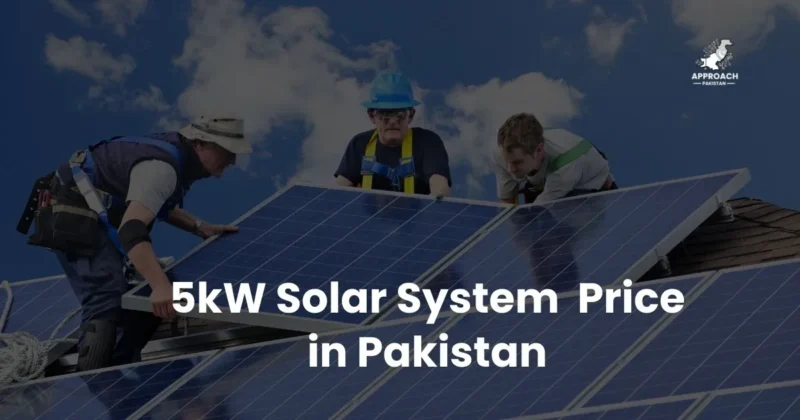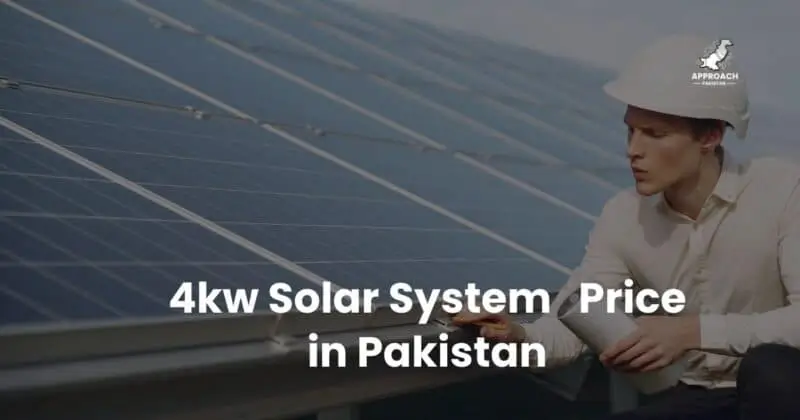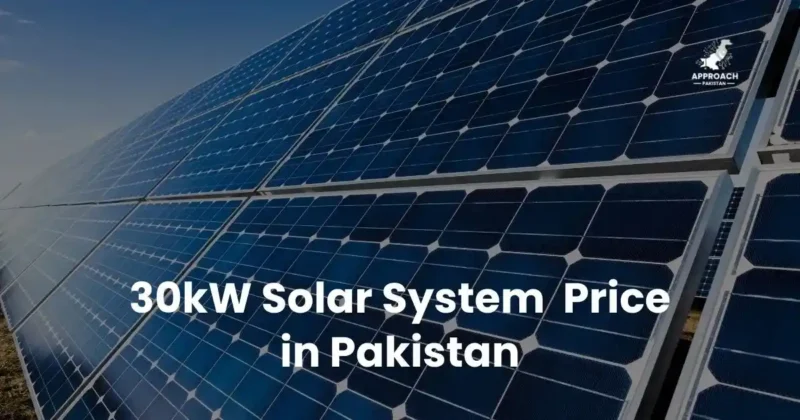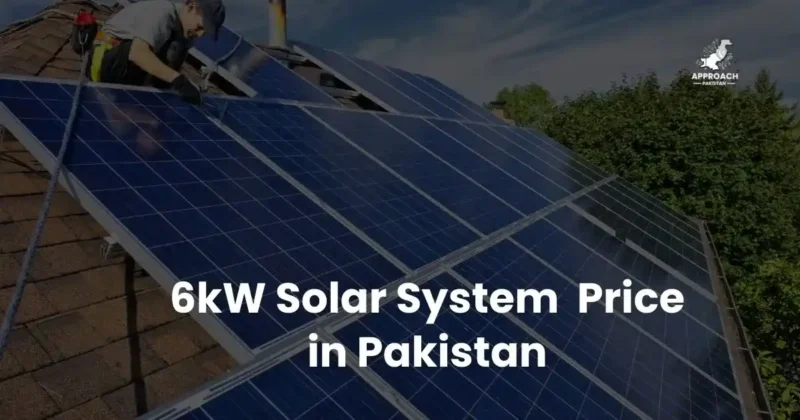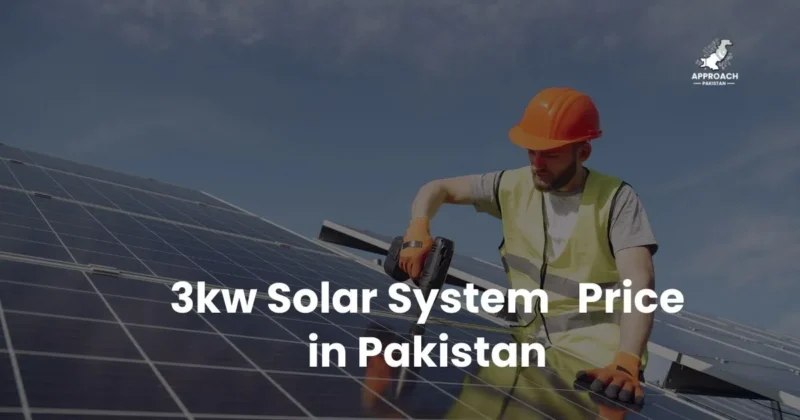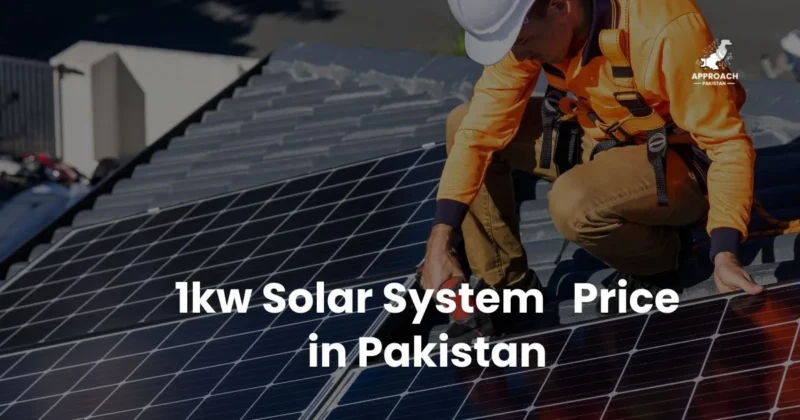20kw solar system price in Pakistan
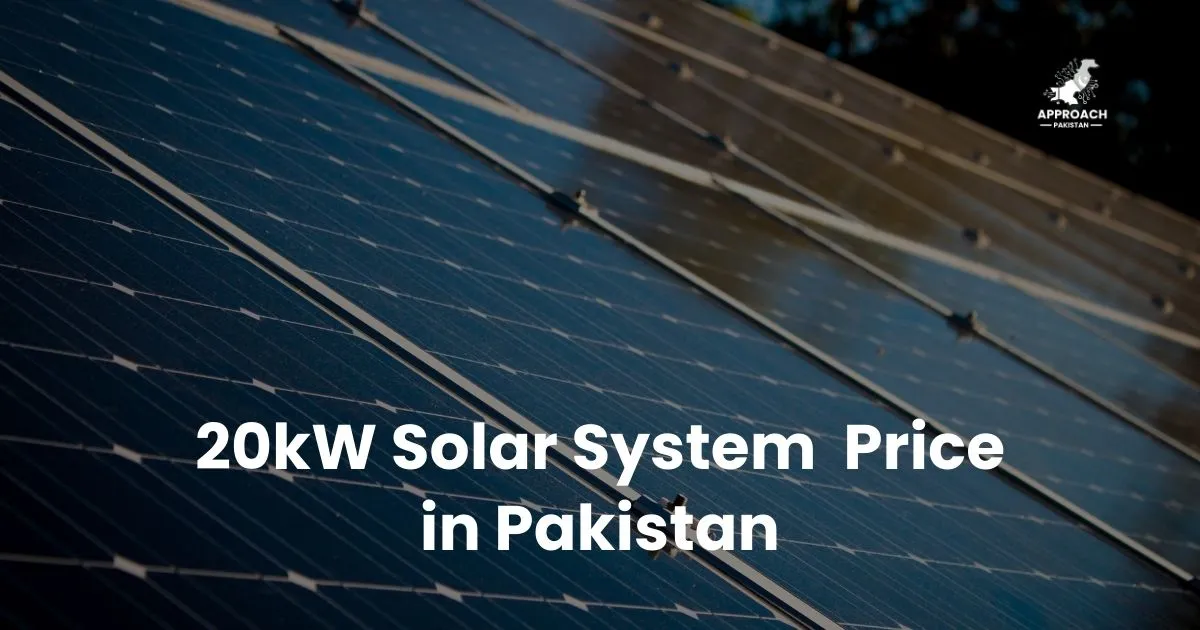
The 20kW solar system installation cost in Pakistan ranges from PKR 1,700,000 to PKR 2,500,000 for basic on-grid configurations, while hybrid and off-grid systems command higher prices due to additional battery storage requirements. These solar panel prices reflect current market conditions influenced by international component costs and local taxation policies.
Current market trends show significant price stabilization compared to previous years, with tier-1 solar panels from brands like Longi, Jinko, Canadian Solar, and JA Solar becoming more accessible. The improved WAPDA grid connection procedures and streamlined net metering processes have further enhanced the value proposition.
Cost Breakdown by Components
A typical 20kW solar system components breakdown includes:
- Solar Panels (40-50% of total cost): Premium 580W-590W monocrystalline panels requiring 34-36 units
- Solar Inverter (20-25%): High-efficiency brands including Goodwe, Solis, Growatt, or SolarMax
- Mounting Structure (8-12%): Galvanized steel frames with weather-resistant coating
- Electrical Components (10-15%): DC/AC protection boxes, cables, and safety equipment
- Installation & Labor (5-10%): Professional installation services and commissioning
Regional Price Variations
20kW solar system price in Karachi typically ranges PKR 1,750,000-2,200,000, benefiting from higher solar irradiation levels and established supplier networks. The coastal city’s peak sun hours averaging 5.5-6 hours daily maximize system performance.
20kW solar system price in Lahore falls between PKR 1,800,000-2,300,000, with slightly higher installation costs due to dust management requirements but excellent solar resource availability throughout the year.
20kW solar system price in Islamabad varies from PKR 1,900,000-2,400,000, reflecting premium installation standards and stricter regulatory compliance, though the capital city offers superior after-sales service networks.
Types of 20kW Solar Systems
On-Grid 20kW Solar System Price & Features
The 20kW on-grid solar system price starts from PKR 1,700,000, offering the most economical entry point into commercial solar solutions. These grid-tie systems connect directly to the national electricity grid, eliminating battery storage costs while enabling net metering benefits.
On-grid configurations excel in areas with stable electricity supply, allowing users to sell surplus energy back to distribution companies. For comprehensive understanding of grid-connected benefits, explore our complete on-grid solar system guide covering all system capacities and net metering procedures.
Key features include automatic grid synchronization, real-time energy monitoring, and seamless integration with existing electrical infrastructure. The payback period for on-grid systems typically ranges 2.5-3.5 years, making them attractive for cost-conscious commercial installations.
Off-Grid 20kW Solar System Price & Components
20kW off-grid solar system price ranges PKR 2,800,000-3,500,000 due to substantial battery bank requirements. These standalone systems provide complete energy independence, ideal for remote locations or areas experiencing frequent power outages.
Off-grid configurations require 80-120 kWh battery storage capacity, typically utilizing lithium-ion technology for optimal performance and longevity. To discover complete off-grid solar solutions and battery backup options for total energy independence, these systems offer unmatched reliability during grid failures.
Essential components include MPPT charge controllers, battery monitoring systems, and automatic load management features ensuring consistent power delivery regardless of weather conditions or grid availability.
Hybrid 20kW Solar System Price & Benefits
20kW hybrid solar system Pakistan pricing falls between PKR 2,200,000-3,000,000, combining grid-tie functionality with battery backup capabilities. These intelligent systems automatically switch between solar, battery, and grid power based on availability and cost optimization.
Hybrid systems offer the best of both worlds, providing energy security during outages while maintaining grid connectivity for surplus energy sales. Explore hybrid solar system benefits and pricing to understand how these systems combine grid-tie convenience with backup power reliability.
Advanced hybrid inverters feature smart energy management, allowing users to prioritize solar power consumption, store excess energy, and minimize grid dependency during peak tariff periods.
Net Metering Enabled Systems
20kW solar system net metering benefits include bidirectional energy flow, allowing consumers to receive credits for surplus electricity generation. The net metering application process involves DISCO registration, technical inspection, and meter installation procedures.
Net metering policies in Pakistan encourage renewable energy adoption through favorable billing arrangements, enabling consumers to offset electricity costs during low-generation periods using accumulated credits from high-generation periods.
20kW Solar System Components & Specifications
Solar Panels (Monocrystalline vs Polycrystalline vs Bifacial)
Premium solar panel efficiency ratings significantly impact system performance and long-term returns. Monocrystalline panels offer 20-22% efficiency with superior low-light performance, while polycrystalline options provide 17-19% efficiency at lower costs.
Bifacial panels represent cutting-edge photovoltaic technology, capturing sunlight from both sides to increase generation by 10-25%. Top-tier brands including Longi, Canadian Solar, Jinko, and JA Solar offer comprehensive warranties and proven reliability in Pakistani climatic conditions.
PERC technology enhancement improves cell efficiency by reducing electron recombination, while half-cut cell designs minimize power losses and enhance shade tolerance.
Solar Inverters (Brands: Huawei, Sungrow, Growatt, Solis)
Inverter technology comparison reveals significant differences in efficiency, monitoring capabilities, and grid integration features. Premium brands like Goodwe, Solis, Growatt, Inverex, and SolarMax offer 97-99% conversion efficiency with advanced grid support functions.
Modern inverters include WiFi monitoring, smartphone apps, and cloud-based performance tracking enabling real-time system optimization. MPPT technology ensures maximum power extraction across varying weather conditions and shading scenarios.
Mounting Structures & Installation Hardware
Galvanized steel mounting structures provide 25-year durability against Pakistani weather conditions including monsoons, dust storms, and temperature extremes. Proper mounting ensures optimal panel positioning for maximum solar irradiation capture.
Installation hardware includes corrosion-resistant fasteners, grounding equipment, and weather sealing components ensuring long-term system integrity and safety compliance.
Battery Storage Options (Lithium vs Lead-Acid)
20kW solar system battery backup time depends on storage capacity and load requirements. Lithium-ion batteries offer 10-15 year lifespan with 90-95% efficiency, while tubular lead-acid batteries provide economical storage with 5-7 year replacement cycles.
Lithium technology supports deeper discharge cycles, faster charging, and compact installation footprints, making them ideal for space-constrained applications requiring reliable backup power.
Electrical Components & Safety Equipment
Comprehensive electrical protection includes DC/AC breakers, surge protection devices, and earth leakage protection ensuring operator safety and equipment longevity. Proper 20kW solar system grounding requirements prevent electrical hazards and lightning damage.
High-quality DC cables withstand UV exposure and temperature variations while maintaining low resistance for maximum power transfer efficiency.
Power Generation & Performance
Daily & Monthly Electricity Generation (kWh)
A 20kW solar system generates 80-100 kWh daily under optimal conditions, translating to 2,400-3,000 kWh monthly production. Actual generation varies based on seasonal changes, weather patterns, and system maintenance quality.
Peak sun hours Pakistan average 4.5-6 hours daily depending on geographic location and seasonal variations. Southern regions including Karachi and Hyderabad experience higher irradiation levels compared to northern mountainous areas.
Seasonal Performance Variations
20kW solar system winter performance typically decreases 15-25% due to shorter daylight hours and lower solar angles. However, cooler temperatures improve panel efficiency, partially offsetting reduced irradiation.
Summer months deliver peak performance with extended daylight hours and optimal solar angles, though extreme temperatures may slightly reduce panel efficiency during afternoon periods.
Peak Sun Hours in Different Pakistani Cities
Solar irradiation levels vary significantly across Pakistan’s diverse geographic regions:
- Karachi: 5.5-6.0 peak sun hours with excellent year-round consistency
- Lahore: 5.0-5.5 peak sun hours with seasonal variations
- Islamabad: 4.5-5.0 peak sun hours with winter reductions
- Faisalabad: 5.0-5.5 peak sun hours with agricultural dust considerations
- Multan: 5.5-6.0 peak sun hours with high summer performance
System Efficiency Factors
Multiple factors influence 20kW solar system performance monitoring including panel cleanliness, inverter efficiency, cable losses, and shading effects. Regular maintenance and monitoring optimize long-term performance and financial returns.20kW solar system dust cleaning cost averages PKR 5,000-8,000 quarterly, representing essential maintenance for sustaining peak efficiency in Pakistan’s dusty environment.
Appliance Load & Usage Capacity
Complete Appliance Load Chart
A 20kW solar system appliances load capacity supports extensive electrical requirements:
| Appliance | Quantity | Power Consumption |
| LED Lights | 40-50 units | 8-12W each |
| Ceiling Fans | 25-30 units | 60-80W each |
| Air Conditioners | 5-8 units | 1.5-2.0 tons each |
| Refrigerators | 4-6 units | 200-300W each |
| LED TVs | 6-8 units | 100-150W each |
| Washing Machines | 3-4 units | 500-800W each |
| Water Pumps | 2-3 units | 1-2 HP each |
| Computer/Laptops | 10-15 units | 200-400W each |
Commercial vs Residential Applications
20kW solar system commercial applications include retail stores, restaurants, small offices, and light manufacturing facilities requiring 2,000-3,000 kWh monthly consumption. Commercial installations benefit from faster payback periods due to higher electricity tariffs.
Residential solar installation of 20kW systems suits large houses with multiple air conditioners, extensive lighting, and high-consumption appliances. Large families and joint family systems find 20kW capacity ideal for comprehensive energy needs.
Load Management & Optimization Tips
Intelligent load management maximizes solar utilization by operating high-consumption appliances during peak generation hours. Smart switching systems and programmable timers optimize energy consumption patterns for maximum savings.
20kW Solar System Savings and Payback Period in Pakistan
Monthly Savings Calculator
20kW solar system monthly savings range PKR 80,000-120,000 based on current electricity tariffs averaging PKR 35-45 per unit. Net metering enables additional revenue through surplus energy sales during low-consumption periods.
Savings calculations consider seasonal variations, system efficiency, and changing electricity tariffs over the system’s 25-year lifespan.
Payback Period Analysis (2-5 years)
20kW solar system payback period varies 2.5-4.5 years depending on system type, local electricity rates, and consumption patterns. On-grid systems offer fastest payback while off-grid systems require longer recovery periods due to higher initial investment.
Commercial installations typically achieve faster payback due to higher electricity consumption and tariff rates compared to residential applications.
25-Year Financial Projections
Comprehensive financial modeling demonstrates substantial long-term savings potential, with systems generating positive cash flow for 20+ years after payback completion. Electricity tariff escalations improve return on investment over time.
Government Incentives & Subsidies
20kW solar system government incentives include net metering policies, reduced customs duties on solar equipment, and simplified approval procedures. SBP financing schemes offer attractive loan terms for solar installations.
Provincial and federal incentives vary, with some regions offering additional rebates or tax benefits for renewable energy adoption.
20kW Net Metering Solar System Cost
Net Metering Application Process
Net metering procedures involve DISCO application submission, technical evaluation, and bidirectional meter installation. Documentation requirements include electrical drawings, equipment specifications, and safety certifications.
Application processing typically requires 30-60 days depending on DISCO efficiency and technical review complexity.
DISCO Procedures & Requirements
Each distribution company maintains specific technical standards and procedures for net metering connections. Understanding regional requirements ensures smooth approval and installation processes.
Billing Credits & Surplus Energy Sales
20kW solar system grid export revenue depends on net metering policies and electricity tariff structures. Consumers receive credits for surplus energy exported to the grid, offsetting consumption during low-generation periods.
Net Metering vs Grid-Tie Differences
While often used interchangeably, net metering specifically refers to bidirectional energy accounting, while grid-tie describes the physical connection method. For detailed comparison, see our complete comparison of on-grid vs hybrid systems explaining technical and financial differences.
20kW Solar Energy System Brand Comparison in Pakistan
Top Solar Panel Brands
Best 20kW solar system brands Pakistan include internationally recognized manufacturers offering proven reliability and comprehensive warranties:
- Longi: Industry-leading efficiency with advanced PERC technology
- Canadian Solar: Balanced performance and value proposition
- Jinko: High-volume manufacturing with competitive pricing
- JA Solar: Innovation focus with premium product lines
- Trina: Established reliability with extensive warranty coverage
Inverter Brand Comparison
Premium inverter brands offer varying features and capabilities:
- Goodwe: Advanced monitoring with cloud connectivity
- Solis: Robust design with excellent grid support functions
- Growatt: Cost-effective solutions with reliable performance
- Inverex: Local assembly with comprehensive after-sales support
- SolarMax: Premium efficiency with extended warranties
Quality vs Price Analysis
20kW solar system quality considerations balance initial cost against long-term performance and reliability. Premium components command higher prices but deliver superior efficiency, durability, and warranty coverage.
Warranty Comparison Chart
Comprehensive warranty comparison helps buyers evaluate long-term value propositions across different brands and suppliers, considering both product and performance warranty terms.
Location-Specific Information
20kW Solar System in Lahore
Lahore installations require specific considerations for dust management and seasonal performance optimization. 20kW solar system price in Lahore reflects local market conditions and installation complexity factors.
20kW Solar System in Karachi
Coastal installations benefit from consistent solar irradiation but require enhanced corrosion protection for electrical components. Salt air considerations influence component selection and maintenance requirements.
20kW Solar System in Islamabad
Capital city installations must comply with stricter building codes and aesthetic requirements while benefiting from superior infrastructure and service provider networks.
Regional Solar Installers Directory
Qualified installers across Pakistan provide professional services with local expertise and after-sales support capabilities essential for long-term system success.
Understanding which solar system type best suits your specific needs requires careful evaluation of energy requirements, budget constraints, and site conditions. For comprehensive guidance on selecting the optimal configuration, explore the pros and cons of each system type to make informed decisions.
Whether you need backup power during outages or want to eliminate electricity bills entirely, the 20kW solar system represents a substantial investment in sustainable energy independence with proven financial returns and environmental benefits.

